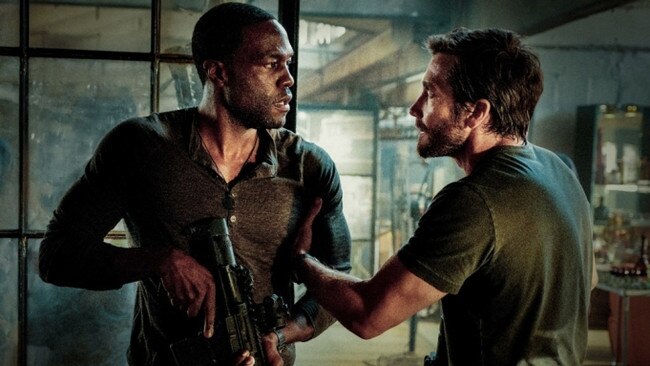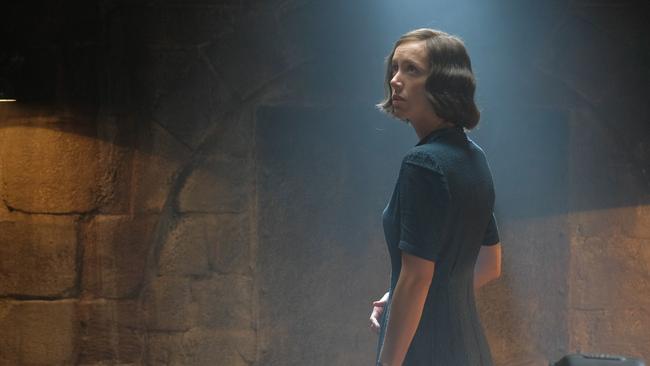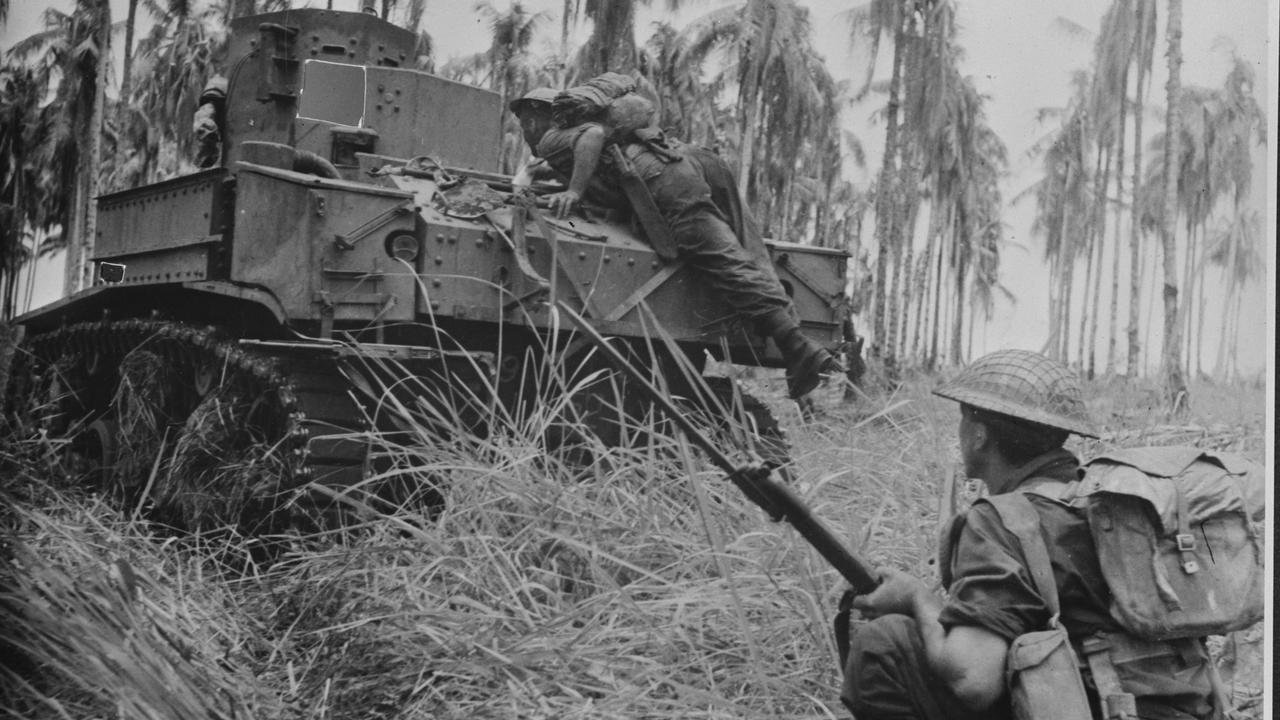Ambulance, an ugly approach to cinema
Yes, it’s possible for Jake Gyllenhaal to star in a bad movie.

Ambulance (MA15+)
In cinemas
★½
Talk about hyperinflation. Danish film Ambulancen (2005), directed by Laurits Munch-Petersen, was a taut action thriller that ran for a brisk hour and 20 minutes. Michael Bay’s Hollywood remake Ambulance unfolds across a bloated 2¼ hours. The plot is more or less the same; the extra running time is mostly taken up with a series of elaborately staged pursuits employing cars, trucks and choppers on and above the streets of Los Angeles.
Jake Gyllenhaal, appearing in a second remake of a Danish thriller after The Guilty, is Danny, a ruthless bank robber who is following in his father’s footsteps in this particular profession. He and a motley gang of tough guys are planning to rob a downtown bank of $32m and for some reason Danny reckons he can’t achieve this without the participation of his adopted brother, Will (Yahya Abdul-Mateen II), a poor but honest veteran of the Afghanistan war (“Afghanistan gave me purpose”) who desperately needs $230,000 to pay for his wife’s experimental cancer surgery. Reluctantly, Will agrees to join the gang as driver, but things go wrong when Zach (Jackson White), a young cop who fancies one of the bank’s tellers, turns up in the wrong place at the wrong time.
In the elaborately staged shootout that follows (somewhat reminiscent of, though not nearly as effective as, a similar scene in Michael Mann’s Heat), Zach is badly wounded and an ambulance is sent to pick him up: paramedic Cam, short for Camille (Eiza Gonzalez), is treating her patient when Danny and Will hijack the ambulance in a desperate bid to escape.
That’s the start of a prolonged series of car chases in which seemingly every police car in LA is involved as well as a host of choppers that hover dangerously over the speeding fugitives.
Both the FBI and an eccentric local police chief become involved in the hunt, while in the back of the speeding ambulance Cam desperately tries to save the life of Zach, an outcome Danny and Will hope will succeed since if Zach dies they face life imprisonment.
The early scenes are jokey, with insider references to Mel Gibson and films such as Braveheart, The Rock and Bay’s Bad Boys franchise.
But for the most part the dialogue is witless (“We’re going to war!” exclaims one of the bad guys as they prepare for the robbery, while Danny describes the heist as “just a job – nothing else”.) While the endless chases, crashes, explosions and deafening cacophony are punishing enough for the viewer, Bay’s maddening visual style is far worse. He is one of (mercifully few) directors working today who believes a swinging handheld camera lends the film a documentary look – at least I assume that’s what he believes.
Guaranteed to affect anyone who suffers from vertigo in a negative way, the film rarely settles down, instead wobbling frenetically all over the place as though the camera operator was having a fit. Ugly is far too kind a word to describe Bay’s approach to cinema.
All of this goes on at such length that it soon becomes tedious. Towards the end there’s a sequence that contains the first real hint of suspense in the movie, but even that is ruined by the director’s visual style.
Gyllenhaal seems to be relishing the character of the thoroughly unpleasant Danny, while Abdul-Mateen II and Gonzalez acquit themselves well as the decent Will and the courageous Cam. Interestingly, despite the excesses of the film as a whole, the usually interminable end credit crawl unfolds in record time.
-
Farewell, Mr Haffmann (Adieu Monsieur Haffmann) (M)
In cinemas
★★★★
Hundreds of films have been made about the Nazi occupation of Paris during World War II, but still they come and still contemporary filmmakers find fresh insights into that terrible time.
In Fred Cavaye’s Farewell, Mr Haffmann, which unfolds in 1941-42 in a Jewish section of the city, Daniel Auteuil gives a commanding performance in the title role. For many years Joseph Haffmann has been a top-class jeweller operating out of a workshop where he creates intricate and beautiful pieces of artwork for his regular clientele and others. He recently has taken on an apprentice, Francois Mercier (Gilles Lellouche), a decent, hardworking but perhaps not especially intelligent man.
As it becomes clear that the German occupiers are starting to round up the city’s Jews, Haffmann realises it’s time to get himself and his wife, Hannah (Anne Coesens), and their three children to safety. The family goes first, and then the jeweller makes Mercier an offer: he, Haffmann, will “sell” Mercier his business on the understanding that if and when the war is over and it’s safe for him to return, the business will be restored to him. Meanwhile Mercier and his wife, Blanche (Sara Giraudeau), can occupy the living area above the shop.
Mercier agrees to this arrangement, but when the time comes for Haffmann to leave he discovers he has left it too late: he can’t evade the German soldiers as he’d been able to do previously, and he’s forced to return to the shop and ask Mercier to hide him in the cellar.
That arrangement actually works well for Mercier because he has found favour with a Nazi officer, Commandant Junger (Nikolai Kinski, son of Klaus Kinski), a vain man who likes to give expensive trinkets to his many girlfriends. Mercier is nowhere near as adept at creating such baubles as Haffmann, so Haffmann, very much against his will, is persuaded to continue to create the diamond-encrusted silver butterflies and other beautiful objects for which Mercier takes the credit. In addition, there’s a growing friendship between Blanche, who desperately wants a child but can’t get pregnant by her husband, and Haffmann. It all makes for a volatile mixture.
Auteuil, with his perpetually pinched, anxious expression, and Lellouche, whose character’s efforts to ingratiate himself with the Germans are pretty clearly risky, are both excellent, a contrast in characters, one wise and self-protective, the other vain and easily manipulated.
Director Cavaye keeps the tension bubbling along in this volatile and dangerous setting, at one time even evoking Alfred Hitchcock in a scene in which a child’s soccer ball is kicked into the cellar where Haffmann is hiding and a couple of Germans who don’t speak French start to retrieve it.
The bleak setting of Paris backstreets in this nightmare period is beautifully evoked in the photography by Denis Rouden and the production design by Philippe Chiffre.





To join the conversation, please log in. Don't have an account? Register
Join the conversation, you are commenting as Logout